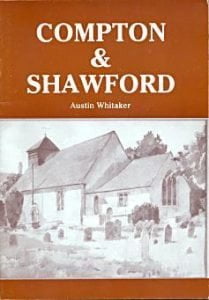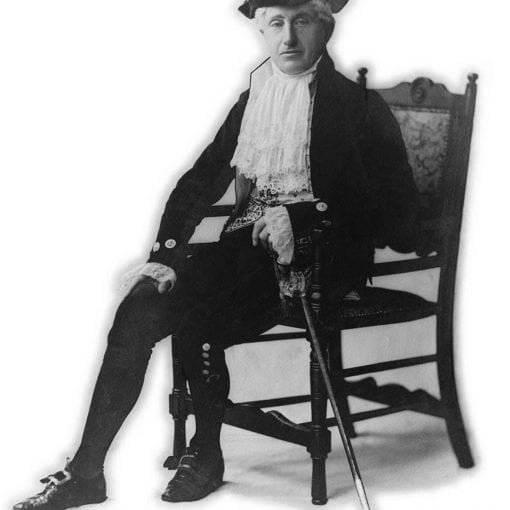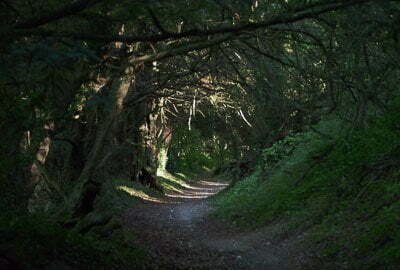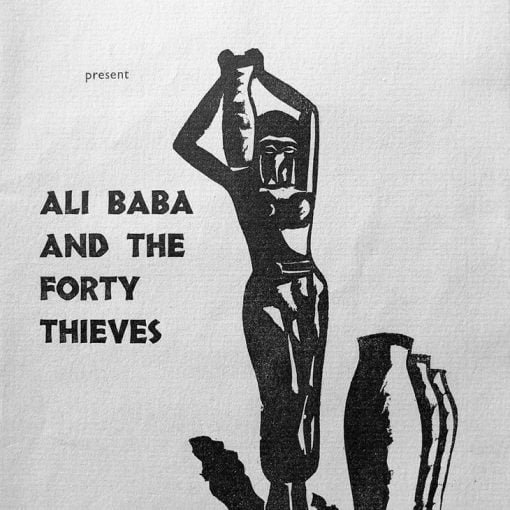Austin Whitaker, Archivist
The Rector’s sermon at the memorial service for Austin Whitaker on 5th January 1998
Psalm 119 v.1: Beati quorum via integra est: qui ambulant in lege Domini. (Blessed are those whose way is upright: who walk in the law of the Lord).

Austin Whitaker was a great walker. Even when he was over eighty years old he would drive from Compton to Barnes Close in Winchester, and leave his car there while he walked first to the railway station, then to various shops in the High Street and Broadway, before calling on friends in Canon Street or Kingsgate Street on his way back to his car. He planned with great enthusiasm the parish walks on Rogation Sunday, and he could be seen on most afternoons walking around the parish. Even when he moved to Otterbourne some three or four years ago, he liked to walk as far as the seat opposite the church, occasionally making it to the top of the hill. I don’t know whether he ever walked the Pilgrim’s Way, but he was fond of John Bunyan’s famous hymn which we will sing at this service. It is also fitting that we should have sung Psalm 122, so familiar (I believe) to all Wykehamists from its use in chapel on Saturday evenings. It is, of course, one of the Songs of Ascent, sung by Jewish pilgrims as they made their way up to Jerusalem.
To describe our journey through life as a pilgrimage is an overworked metaphor, but a useful one as we look back over Austin’s life and thank God for his achievements and our memories of him. Although there are many here today who knew him much closer and much longer than I did, since I first met him only in the spring of 1986, I am very grateful to those who have shared with me their memories and their knowledge of Austin. For over fifty years he made a significant contribution to the life of Winchester – College and City – and Compton, where he lived for most of his retirement, but his early life was spent in the north of England. Born in Hull, the son of a Unitarian minister, he grew up in Lancashire and was educated at Manchester Grammar School and Liverpool College, crossing the Mersey by ferry to school every day from his home in Birkenhead.
In 1925 he went up to Magdalen College, Oxford, a place which he dearly loved for the rest of his life. He was placed in the First Class in Classical Mods and the Second Class in Greats, but his degree was good enough to land him a post as a lecturer in Classics at Durham University. Some years ago he wrote an article in the Durham University Journal about his highly eccentric and amusing colleagues there. It was at Durham that he first learned to carve a saddle of beef.
In 1932 he married Mary Milner Cowburn, the mother of his four children, and took up a post as assistant master at Tonbridge School. Among those he taught there was Professor Owen Chadwick. He also had a moment of glory when a Messerschmidt crash-landed near the school. With the help of two boys he set out to capture the pilot. They had just one pistol between them. The boy who held it was so nervous that the pilot feared he might shoot him accidentally. “Don’t worry, sir” the boy replied, “It’s not loaded”. Despite this gaffe, Austin returned, like a Roman Emperor, in triumph, with his prisoner secured simply by the force of his personality rather than through force of arms.
In 1942 he came to Winchester College and at first taught classics at a senior level, though he later preferred to teach English literature and History in the middle part of the College. Many of those who were lucky to be taught by him – and they include some leading figures in Church and State, such as Lord Howe of Aberavon, Sir Jeremy Morse and Bishop Geoffrey Rowell – remember him with great affection. He had a keen and precise mind and loved polysyllabic words. ‘Don’t oscillate’, he would say to a boy who was fidgeting. ‘Shall I tintinnabulate?’, he inquired with his finger on a door-bell. ‘Did you pernoctate?’, he asked when a colleague returned from a visit to Oxford.
Soon after I came here I asked him to take me on a visit to Winchester College, as I wanted to see the College through his eyes. (He had already introduced me to the fascinating letters in the College archives to and from my predecessor of 200 years ago, Philip Williams). We went into all the main buildings of the College, and he told me about their history and associations. We even found the room in which he used to teach, which looked (he said) just the same. But what I remember most vividly was the warmth with which he was greeted by old friends and former colleagues, and the extraordinary courtesy with which he spoke to a 15-year old, to ask his permission to take me into a more private room in the College.
Winchester College has had many remarkable members of staff over the years, but I doubt whether any of them so personified all that is best about it as Austin Whitaker. His love of sound learning and his gracious and courteous manner must have left an indelible mark on all whom he knew during his 27 years there.
For seventeen years, from 1966 to 1983, he was Winchester City Archivist. During these years he built up an unrivalled knowledge of the city’s records and supervised their transfer to the County Record Office in 1975. It was a post for which he was ideally suited. Among other initiatives he recorded a valuable series of interviews with older residents of the city. Those who knew him as an archivist likewise recall with affection his diligence and courtesy. He also lectured on local history for the WEA and for many years spent much of his holidays marking exam papers (which he had set) for the Oxford Local Board.
Here in Compton too he was greatly loved. He belonged to the Over 60’s Club, organised for some years the Ecumenical Discussion Group and took a close interest in the village school. Some years ago he took his last lesson when, as the schoolmaster in cap and gown during a Victorian Day at the school, he recounted to the children the story of Icarus. For some years he helped to the run the Saturday Club. In 1985 he published a valuable short history of Compton and Shawford. He was a churchwarden here for several years, and it was a lesson in gracious humility to see him serving at the altar and administering the chalice at communion services. It is rather fitting that we should be here on the Eve of the Epiphany of Our Lord. I once asked Austin to read the story of the wise men at a carol service. He read it, of course, with great beauty and dignity – almost as though he were one of them.
Austin was proud of his large and growing family. They all will have many private and personal memories of him to cherish today. During the course of his long life he knew all too keenly the pain of bereavement – the tragic death of one of his daughters and some of her family, and the deaths of both his wives. I shall not forget the bleak evening I sat with him nearly two years ago the day Gwyneth died. Even before these last few months he was often unwell. He used to suffer from strange turns, often in the early morning, when his blood pressure dropped alarmingly, and he sometimes needed to spend some days in hospital. On another occasion, he was rushed to hospital in the middle of the night for an emergency operation.
When I called to see him a day or so later, I expected to find him semi conscious. Not a bit of it – he was sitting up in bed reading a book about Oliver Cromwell! It is fitting that we should give thanks today for all who cared for him, especially those at the Old Parsonage. The last vivid image that many here today may have of him was at his 90th birthday party last May when he held court at the Old Parsonage, surrounded by so many of his family and friends, giving to all and each a kindly word of greeting and thanks.
Austin had a particular interest in the 18th century, and it is appropriate that today’s service should include a prayer by Samuel Johnson, whom he greatly admired. His own love of 18th century poetry resulted in a study of the poet James Hurdis, which was published in 1960.
Austin’s pilgrimage, then, led him from Hull and the north-west of England, to Oxford, Durham, Tonbridge and finally to Winchester. But the pilgrim’s goal must always be beyond this life. His footsteps must ever lead him towards the heavenly Jerusalem. As we lay his mortal remains today in the shadow of this church which he knew so well, so we rejoice that Austin is now on another shore and in a greater light. I think he would have appreciated some words of an anonymous French monk in the 12th century, who wrote about the glories of the heavenly Jerusalem, the City of God:
‘City of God! What glorious things have they not said of thee!… Blessed is the hour when we shall enter into this land, where the Lord as he passes will minister unto us, while the angels rejoice and the saints enjoy bliss everlasting… Then will our hearts rejoice with the fullness of joy, and our joy no one shall take from us: for what we are now in expectation, then shall we be in reality: sons of the kingdom, united to the angels, eternal inheritors of God, co-heirs with Christ, by the same Christ, our Lord, who with the Father and the Spirit liveth and reigneth, world without end. Amen’.
In paradisum deducant te angeli: in tuo adventu suscipiant te martyres, et perducant te in civitatem sanctam Jerusalem.
reproduced by permission of the Rector, Rev P L S Barrett
from the Compton & Shawford Parish Magazine February 1998
Sadly, Philip Barrett himself passed away not long afterwards, dying on 22 April 1998.




